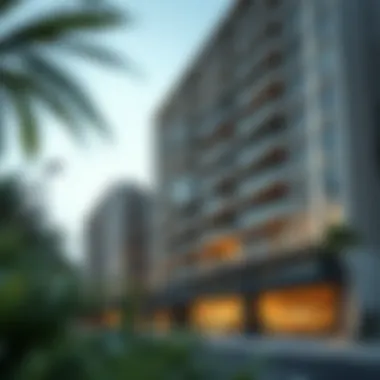Exploring Rental Options in Dubai's Real Estate Market


Intro
In the intricate web of Dubai's real estate market, the rental landscape offers both challenges and opportunities for a diverse array of participants. From expatriates searching for temporary refuge to savvy investors seeking lucrative returns, understanding the rental options available is key to navigating this vibrant metropolis.
Dubai's rental scene is characterized by a mix of both long-term and short-term leases, each catering to distinct needs and circumstances. As we venture deeper into this article, we'll uncover the subtleties of approaching leases, the legal frameworks that underpin them, and how market trends shape the choices available to both tenants and landlords.
In a city known for its rapid development and shifting demographics, knowing how to leverage the rental market is invaluable. Whether you're a first-time tenant, landlord, or a seasoned investor, this article aims to illuminate the various pathways available in Dubai’s rental market, ensuring that you can make informed and strategic decisions.
Market Trends and Analysis
Current Market Overview
The rental market in Dubai has seen a remarkable transformation over the past few years. According to the Dubai Land Department, as of late 2023, rental prices have stabilized after experiencing fluctuations, making it an opportune time for both tenants and landlords to engage. The influx of skilled professionals and global expatriates looking to call Dubai home is driving demand across various neighborhoods, such as Dubai Marina and Downtown Dubai.
Interestingly, amidst this growth, the focus has shifted towards more affordable housing options, with many landlords adapting to meet the needs of budget-conscious tenants. In contrast, luxury properties, while still commanding significant rent prices, are experiencing slower growth as developers increase the supply of mid-range options.
Future Projections
As Dubai aims to position itself as a global hub for tourism and business, projections indicate a continuous rise in rental demand over the coming years. Market analysts predict that areas like Dubai South and the expanding Dubai Hills Estate will become hotspots for rental investments.
Furthermore, as the city gears up for the World Expo and beyond, there is potential for an uptick in property value, stimulating a favorable environment for landlords looking to maximize their rental yields.
The rental market's resilience is evident as Dubai continues to adapt and innovate, attracting both residents and businesses alike.
Investment Opportunities
High-Growth Areas
Investing in Dubai's rental market requires a keen eye for emerging neighborhoods that promise growth and stability. Among the high-growth areas, Al Furjan and Jumeirah Village Circle (JVC) stand out. These locations offer competitive rental prices, making them appealing for families and young professionals alike. As the infrastructure develops and more amenities become available, expect interest to surge.
Rental Yield Insights
Rental yields in Dubai can vary widely depending on the location and type of property. Generally, areas like Dubai Marina and Downtown Dubai offer lower yields due to high property prices, while more affordable neighborhoods like Al Quoz and Deira yield higher returns for investors.
- Average rental yields in popular areas:
- Dubai Marina: 5-6%
- Downtown Dubai: 3-4%
- Jumeirah Village Circle: 7-8%
- Al Furjan: 6-7%
The key takeaway for investors is to identify properties with potential for appreciation alongside a strong rental demand, enhancing returns over time. This understanding enables investors to be agile in their decision-making, whether negotiating terms with landlords or considering long-term investments.
By grasping the nuances of Dubai’s rental options, potential investors, tenants, and landlords can approach the market effectively, optimizing their choices amidst a diverse and rapidly evolving landscape.
Overview of Rental Property in Dubai
The landscape of the rental property market in Dubai is as vibrant and dynamic as the city itself. For those exploring the realm of real estate, understanding this market is not merely useful; it's essential. Dubai's rental market represents a significant part of the overall economy, drawing a diverse crowd from expatriates to investors and families. This section will delve into the importance of the rental market and the trends influencing rental prices, shedding light on why this segment is so crucial for anyone interested in Dubai's ever-evolving real estate environment.
Importance of Rental Market
The rental market in Dubai has gained considerable attention due to a few key factors. Firstly, the city has become a global hub for business, tourism, and culture. With millions flocking to this emirate, the demand for rental properties has skyrocketed. This rise isn’t merely about the number of properties available; it also reflects the economic vitality and livability of Dubai itself.
Potential tenants, whether individuals seeking a place to live or families looking for quality housing, find the rental market to be a viable option to access the Dubai lifestyle without the hefty commitment of purchasing property. This flexible nature is often more appealing to both newcomers and existing residents who value mobility over permanence.
Moreover, the rental market contributes to Dubai's economic fabric by attracting foreign investment. Investors looking to capitalize on real estate find rental properties to be lucrative opportunities, given the attractive yields that Dubai's diverse neighborhoods can provide. Indeed, with this influx of residents and investors, understanding rental options has become paramount for effective decision-making in real estate.
Trends in Rental Prices


Keeping a finger on the pulse of rental prices in Dubai can help stakeholders make well-informed investments. The landscape of rental prices is constantly fluctuating, influenced by economic factors, changes in demand, and shifts in the general state of regional and global economies.
The last few years have shown rental prices reflecting a more stable trend after witnessing a peak just before the global financial changes. Areas that were once beyond the means of many have begun to offer more competitive pricing, making them accessible to a wider audience. Some of the younger districts are evolving, with affordable options popping up alongside luxury listings, further diversifying the market.
Another noteworthy trend is the rise of smart homes, leading to varying rental prices based on the amenities offered. As technology seeps into everyday life, renters have started gravitating towards properties fitted with modern conveniences—these developments often demand a premium due to perceived value.
"The real estate market in Dubai is a melting pot where traditional practices meet modern dynamics, creating a unique environment for rental possibilities."
In summary, a thorough understanding of the rental property market in Dubai not only aids renters in finding their ideal living conditions but equips investors with the insights needed to navigate this bustling marketplace successfully. By staying attuned to market trends and recognizing the overarching importance of rentals, all parties can position themselves wisely and capitalize on Dubai's flourishing real estate landscape.
Types of Rentals Available
Understanding the various types of rentals in Dubai is crucial for both tenants and investors. The city presents a vibrant landscape steeped in opportunity, reflecting a tapestry of choices from residential apartments to commercial spaces. Unearthing the benefits and considerations of these rental options can lead to better decisions, whether one is looking for a cozy nook to call home or a strategic location for a business.
Residential Leasing Options
Residential leasing in Dubai offers a wide spectrum of choices, catering to different lifestyles, budgets, and family sizes. From high-rise apartments with stunning views of the skyline to villa communities nestled in green neighborhoods, the options are seemingly endless. Some popular residential areas include Dubai Marina, Downtown Dubai, and Jumeirah. A key characteristic of residential rentals is the flexibility in lease durations. Most leases can range from annual contracts to month-to-month arrangements, accommodating the diverse needs of the expat community.
For newcomers, understanding the different property management companies is essential. These entities maintain properties and ensure that tenant needs are met. However, potential renters should also remember that rental prices can fluctuate based on the neighborhood's popularity, amenities offered, and even proximity to schools or public transportation.
Commercial Rental Spaces
On the business front, commercial rental spaces in Dubai are on the rise. These include office spaces, retail units, and even warehouses. The ever-growing economy attracts a slew of entrepreneurs and multinationals, making such spaces hot commodities.
Among the benefits of commercial rentals is the potential for high returns. Investing in a strategic location, like the Business Bay or Dubai Financial District, can provide steady cash flow. However, landlords and tenants alike must be vigilant about local regulations and zoning laws, which can differ significantly from residential leasing. Understanding the dynamics of commercial space – such as layout, foot traffic, and visibility – plays a pivotal role in the success of a business.
Short-Term vs. Long-Term Rentals
When it comes to rental duration, it’s vital to weigh the pros and cons of short-term and long-term leases, aligning them with personal or business objectives.
Advantages of Short-Term Rentals
Short-term rentals have become increasingly popular, especially in tourist-heavy areas like Palm Jumeirah or Dubai Mall. One of the main advantages is flexibility. These spaces enable renters to enjoy lavish surroundings without the commitment of long-term leases. For example, platforms like Airbnb and Vrbo allow landlords to maximize occupancy rates during peak seasons, capitalizing on tourism influx.
The accommodation aspect is another unique feature. Short-term rentals often come fully furnished with amenities, offering a seamless transition for travelers. However, hosts should consider the management effort involved and be prepared for turnover, which can include constant cleaning and maintenance. Not to mention, regulatory compliance is vital as Dubai has specific laws governing short-term lets.
Considerations for Long-Term Leasing
Long-term leasing is generally favored by those seeking stability and predictability in their housing situation. Such agreements usually span a year or more, offering tenants security against fluctuating rental prices. A key characteristic here is landlords or property management companies may provide tenant benefits, like lower rates for extended stays.
Nevertheless, potential downsides exist. Long-term renters might find themselves stuck in a lease where the amenities or property condition do not meet evolving needs, leading to dissatisfaction. Plus, removing a tenant or breaking a lease can be complex and involve legal procedures. Evaluating the location, potential growth in the area, and upcoming developments must be at the forefront of decision-making when considering long-term rentals.
"Understanding the nuances of rental options can provide an edge, not just for tenants but also for landlords looking to optimize their investments."
Navigating the types of rentals in Dubai requires careful consideration of personal or business goals while remaining flexible to shifts in the market. Whether the focus is on residential or commercial spaces, weighing the advantages of either short-term or long-term leasing is essential to make informed decisions.
Legal Considerations in Dubai Rentals
Navigating the rental landscape in Dubai demands a solid grasp of legal considerations. Understanding the laws and regulations that govern rentals is crucial for both tenants and landlords. Such knowledge can be the difference between a smooth rental relationship and potential conflicts, ensuring that all parties are well-informed and their rights are respected.
Tenancy Laws Overview
Dubai's rental agreements are largely governed by Law No. 26 of 2007, which was amended by Law No. 33 of 2008. This legislation provides a framework that regulates the relationship between landlords and tenants. The essence of these laws lies in their attempts to create a balanced approach that protects the interests of both? landlords and tenants.
Key aspects of tenancy laws in Dubai include:
- Registration of Lease Contracts: All tenancy contracts must be registered with the Dubai Land Department (DLD). This step is vital in securing the legal validity of a lease agreement.
- Duration of Lease: While leases can be short-term or long-term, the law stipulates specific terms that must be adhered to, influencing how agreements can be renewed or terminated.
- Dispute Resolution: In case of conflicts, the Rental Disputes Settlement Center handles disputes. This specialized court aims to resolve issues efficiently, favoring mediation to settle disagreements swiftly.


Rights and Responsibilities of Tenants
Tenants in Dubai enjoy several rights that form the backbone of the rental process. Awareness of these rights is crucial, as it enables tenants to assert themselves and avoid exploitation.
Key rights include:
- Right to a Safe and Habitable Space: Tenants are entitled to live in a property that meets health and safety standards, free from hazards.
- Right to Privacy: Any entry into the rental property by landlords must come with prior notice, except in emergencies.
- Stability in Rent: Tenants should be aware of the limits on how much landlords can increase rent annually, which is determined by the Real Estate Regulatory Agency (RERA).
On the flip side, tenants also bear responsibilities:
- Timely Payment of Rent: Tenants must pay rent on time, as failing to do so can lead to eviction.
- Maintenance of the Property: While landlords are responsible for major repairs, tenants should maintain the property and report any issues promptly.
Landlord Obligations
Landlords, too, have specific obligations that must be fulfilled under Dubai’s tenancy laws. Understanding these can help landlords manage their properties effectively while ensuring compliance with local regulations.
Landlord obligations include:
- Maintaining the Property: Landlords must ensure that the property meets all safety and maintenance standards. This includes essential repairs that may arise during the tenancy.
- Returning Deposits: After the lease ends, landlords are required to return the security deposit unless there are legitimate deductions for damages.
- Respecting Tenant Rights: Landlords must adhere to the agreed terms in the lease and cannot make arbitrary changes to rental terms without proper notice.
"Understanding legal considerations is not just about following the rules; it's about fostering a positive relationship between landlords and tenants, built on respect and clear communication."
Impact of Economic Factors on Rental Market
Understanding the impact of economic factors on Dubai's rental market is crucial for anyone engaging in real estate transactions. The rental landscape is a reflection of broader economic trends, which means that shifts in the economy often ripple out to influence pricing, availability, and even tenant behavior. In Dubai, a city that thrives on its cosmopolitan appeal and international investments, these factors play a significant role.
Effect of Supply and Demand
Supply and demand is a cornerstone of real estate economics, and it operates much the same way in Dubai as it does elsewhere. When demand for rental properties outpaces supply, prices typically rise. Conversely, an oversupply can lead to price drops. In Dubai, frequent fluctuations in demand can be attributed to numerous factors such as population growth, economic stability, and changes in foreign investment patterns.
For instance, areas like Dubai Marina and Downtown Dubai often experience high demand due to their strategic location and amenities. This can lead to landlords raising their prices. Conversely, if an area sees too many new developments—think of a flood of luxury apartments—competition drives prices down. Thus, for potential renters or investors, keeping an eye on these trends can provide insight into the best times to engage either in renting or in investing.
- Key elements influencing supply and demand include:
- Population growth and migration patterns
- Economic cycles affecting job opportunities
- Availability of new housing developments
Understanding these elements helps renters anticipate shifts in the market.
Influence of Foreign Investment
Foreign investment is another major player in Dubai’s real estate rental sector. The city has positioned itself as a global hub attracting individuals and companies from around the world, which makes it a prime location for investors. For example, investors from countries like India, the UK, and China often look to Dubai for real estate opportunities. This influx of capital not only enhances the overall market but also drives rental prices.
Heavy foreign investment typically leads to the construction of new luxury accommodations, which can cater specifically to expatriate communities. These developments can raise the expectations of renters, who may seek out more luxurious or conveniently located spaces.
"The foreign influx means that landlords must continuously adapt to the shifting expectations of an international clientele, pushing for better amenities and services."
In summary, both supply and demand dynamics and the influence of foreign investment have a profound effect on Dubai's rental market. For investors and renters alike, keeping a sharp eye on these economic factors is paramount to making informed decisions in this vibrant marketplace.
Navigating the Rental Process
Understanding the rental process in Dubai is crucial for anyone looking to secure a leasing arrangement, whether for personal or investment purposes. The landscapehere can be a bit tricky to navigate, particularly for newcomers or those unfamiliar with the local market dynamics. Knowing how to find properties effectively and understanding the steps to secure a lease can save potential tenants a lot of heartache. Plus, being informed can also lead to more favorable lease terms, something that everyone can appreciate.
Finding Suitable Properties
Using Online Platforms
Utilizing online platforms like Property Finder or Dubizzle has revolutionized how individuals search for rental properties in Dubai. These sites are user-friendly and allow users to filter their preferences like location, price range, and even amenities. The integration of detailed images and sometimes virtual tours can make the decision process less daunting. These platforms facilitate comparison shopping, giving potential renters a bird's-eye view of what's available in their desired area.


However, just as it’s common to find a diamond in the rough on these platforms, it's equally possible to encounter listings that don’t quite match reality. This factor cannot be overlooked; therefore, relying solely on online resources without further verification can lead to disappointment. Still, the convenience and breadth of options offered generally make online platforms a favorable choice.
Working with Real Estate Agents
On the flip side, working with real estate agents brings its own unique advantages. Agents often provide invaluable insights into the local market and can help filter listings based on the client’s needs. Their deep understanding of the neighborhood nuances, rental trends, and leasing laws can place clients in a stronger negotiating position. Moreover, many agents have access to listings that are not publicly advertised, giving clients a competitive edge in a bustling market.
However, potential renters should be mindful of agent fees, which can sometimes add an unexpected layer of cost to the process. Despite this, the personalized service and peace of mind that comes from having an expert in your corner makes hiring a real estate agent a choice many find worthwhile.
Steps in Securing a Lease
Once suitable properties are identified, the journey to securing a lease begins. This phase involves assessing the terms laid out in the lease agreement, negotiating where necessary, and sometimes even putting down a deposit. It’s essential for tenants to grasp the fine print—this affects anything from maintenance responsibilities to the conditions for terminating the lease.
- Review the Lease Agreement: Scrutinize all terms and conditions.
- Negotiate Terms: Don't shy away from negotiating clauses that don’t sit well with you.
- Document Everything: Ensure that all agreements made verbally are documented in writing to avoid misunderstandings down the line.
- Finalize Payments: Be clear about payment methods and schedules to maintain a smooth landlord-tenant relationship.
Challenges Faced by Renters
When navigating the bustling and vibrant rental market in Dubai, renters often find themselves grappling with various hurdles. Understanding these challenges is crucial for anyone looking to lease property in this dynamic city. Being aware not only equips renters to make better choices but also enhances their overall experience in securing suitable accommodations. Tackling issues like scams and hidden costs can significantly improve the rental journey.
Dealing with Rental Scams
The rise in rental scams poses a pressing challenge for those looking for housing in Dubai. The city’s real estate charm attracts many new residents, making it a prime playground for unscrupulous individuals. These scams can take many forms—fake listings, impostor landlords, and deceptive contracts are just the tip of the iceberg.
Identifying a scam often involves a few red flags. If a listing appears too good to be true, it probably is. Similarly, requests to pay deposits through untraceable payment channels are cause for concern. Before providing any money, savvy renters should:
- Research the property’s legitimacy through reputable real estate websites.
- Verify the landlord’s identity and ownership rights through documentation.
- Meet in person at the property when possible and inspect it thoroughly.
Another vital step is to trust one’s instincts. If something feels off, it's always better to err on the side of caution. The thing to remember is: due diligence in the beginning can save significant heartache later.
Understanding Hidden Costs
Along with scams, unsuspecting renters often fall prey to hidden costs associated with rental agreements. These costs can add up quickly and may not be immediately apparent during property viewings or negotiations.
Common hidden costs renters should be aware of include:
- Maintenance Fees: Many properties in Dubai come with monthly or annual fees for upkeep. It’s crucial to clarify if these fees are included in the rent.
- Utility Costs: Water, electricity, and internet bills can vary significantly, and some landlords may require these to be paid upfront or separately.
- Service Charges: For those living in communities with amenities, service charges for pool maintenance, gym access, and security can be another layer of expense that renters might overlook.
Renters should always ask detailed questions about what is included in the total rent and seek clarity on any additional charges. The importance of budgeting for these unexpected costs cannot be overstated—having a clear view of total expenses can ease the financial strain as one settles into the new home.
"A little prevention goes a long way—being informed cuts the chance for unpleasant surprises."
In summary, awareness about the challenges faced when renting in Dubai prepares individuals for a more fruitful and less stressful experience. From spotting scams to understanding expenses, being proactive can help renters navigate the intricate real estate landscape in this thriving metropolis.
Future Outlook of Rental Market
The future landscape of rental options in Dubai's real estate market is critical for a wide range of stakeholders, including tenants, landlords, and investors. Understanding potential trends not only aids in making informed decisions but also prepares all parties for evolving market dynamics. The rental market in Dubai is influenced by various factors such as economic fluctuations, infrastructure developments, and demographic changes. By examining these elements, stakeholders can set their sights on opportunities before they become mainstream.
Predictions for Rental Price Trends
When forecasting rental price trends in Dubai, several indicators come into play. Post-pandemic recovery is a significant factor. With an improving economy, we can anticipate a gradual increase in demand for rental properties, which may push prices higher. Furthermore, as lifestyle preferences change, amenities that cater to remote working or green living might gain prominence, affecting rental prices accordingly.
- Expected Stabilization of Prices: While there may be short-term fluctuations, longer-term predictions suggest a stabilization of rental prices as supply meets demand. This could provide more certainty for both landlords and tenants.
- Impact of Foreign Investment: Continued interest from foreign investors will likely stimulate certain neighborhoods, leading to potential price surges in those areas. Investors will closely watch regions gaining traction.
- Evolution of Community Living Spaces: There is a growing preference for residential developments that foster community living. Consequently, rentals within such spaces may see heightened demand, inflating their price tags.
"Awareness of the broader economic picture will enable stakeholders to stay ahead of potential market shifts."
Understanding these trends empowers renters and investors alike to navigate the complexities of the marketplace effectively.
Emerging Neighborhoods for Renters
As the rental market evolves, some neighborhoods in Dubai are rapidly becoming sought-after destinations. These areas may not have been on the radar a few years ago, yet they are now presenting exciting opportunities. Here are a few notable mentions:
- Jumeirah Village Circle (JVC): Known for its affordability and family-friendly environment, JVC has rapidly developed, offering various amenities for residents. This area continues to attract families and young professionals looking for value.
- Dubai Creek Harbour: The blend of modernity and nature sets this area apart. With projects that highlight waterfront living, Dubai Creek Harbour is cultivating a unique lifestyle, accessible at competitive rental prices compared to other upscale neighborhoods.
- Mohammed Bin Rashid City: Positioned to become one of the largest mixed-use developments, the area promises excellent facilities and is drawing in diverse renters and families keen on upscale facilitated living.
- Al Furjan: Balancing affordability with quality living, Al Furjan combines excellent transport links and community amenities, making it far more desirable to newcomers and long-standing residents alike.
Keeping an eye on these emerging neighborhoods can provide valuable insight to potential tenants and investors seeking up-and-coming opportunities, ultimately influencing their rental strategies moving forward.











